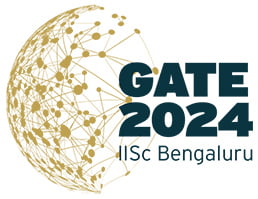September 20, 2023
Common Tests Required for Admission to Master’s in Germany
By Deepthi Kurian
Planning to pursue a master's degree in Germany is an exciting endeavour. But it comes with its fair share of challenges. The first and foremost challenge is meeting the admission requirements. German universities have varying criteria, and different master's programs may have specific entry requirements. As part of your admission process, you may have to produce the results of certain tests at the universities. If you know which tests you have to take, you can plan ahead and get through the admission process without any trouble. In this article, I shall introduce you to all the common tests required for admission to a master's degree in Germany and discuss their key details.
Check out our video on the common tests that you will have to take if you want to study master's in Germany.
Overall, these tests can be categorized into those which prove your German and English language proficiencies, and aptitude tests that can prove your eligibility for master's programmes.
German Language Proficiency Tests

GIF by EssamAlnaser83/tenor.com
If you're an international student, particularly from India, looking to study in Germany, demonstrating your proficiency in the German language is a crucial step. While the German language is not mandatory for admission to courses taught completely in English, it is, nonetheless, a major advantage when applying for admissions. Here are some commonly taken German language proficiency tests:
Test Deutsch als Fremdsprache (TestDAF)

Test Deutsch als Fremdsprache (TestDAF) is a prestigious advanced-level German language examination conducted by the TestDaF-Institut. It measures language proficiency within the B2-C1 range on the CEFR scale and has test centres in 95 countries worldwide, including key locations in India such as New Delhi, Chennai, Bangalore, Coimbatore, and Pune. This comprehensive test offers three levels of grades (TDN 3, TDN 4, and TDN 5), with TDN 4 being the requirement for most German universities, although some technical colleges accept TDN 3. TestDAF consists of four sections: Listening Comprehension, Reading Comprehension, Writing, and Speaking. The exam normally lasts from 3 to 3.5 hours and there is an examination fee of approximately ₹9,100.
Deutsche Sprachprüfung für den Hochschulzugang (DSH)

The Deutsche Sprachprüfung für den Hochschulzugang (DSH) is another important German language examination, widely recognized by almost all universities in Germany. It assesses language proficiency across three levels of grades: DSH-1 (57-67%), DSH-2 (67-81%), and DSH-3 (82% & above) corresponding to B2, C1, and C2 on the CEFR scale. Typically, most German universities require aspiring students to achieve a DSH-2 or DSH-3 score, although certain technical courses may admit students with a DSH-1 score.
The DSH test comprises written and oral components, with a total test duration of 3 hours and 40 minutes. Importantly, only those who pass the written section are eligible to proceed to the oral examination. The test fees for DSH vary between ₹4,500 and ₹15,500, depending on the test centre, and it's worth noting that the DSH can only be taken within Germany. This examination serves as a valuable alternative for candidates who are unable to take the TestDAF in their home country.
Goethe-Zertifikat C2: Großes Deutsches Sprachdiplom (GDS)

The Goethe-Zertifikat C2: Großes Deutsches Sprachdiplom (GDS), often referred to as the Goethe-Zertifikat C2, is a highly advanced-level German language test that aligns with the C2 level on the CEFR scale, certifying an exceptional command of the German language. The test is administered by the prestigious Goethe-Institut and this examination assesses understanding of complex texts and the ability to communicate eloquently in both spoken and written forms. There are multiple test centres in India, located in major cities like New Delhi, Chennai, Bangalore, Coimbatore, and Pune. Importantly, achieving the Goethe-Zertifikat C2 is recognized as an important proof of the language proficiency necessary for teaching German.
English Language Proficiency Tests

GIF by ylihao/tenor.com
To encourage international students to come to Germany for higher education, most universities in Germany offer international master's programmes which are taught fully in English. To gain admission to these courses, you'll need to prove your English language proficiency with a standardized test. These are the common tests accepted at universities in Germany:
Test of English as a Foreign Language (TOEFL)

The Test of English as a Foreign Language (TOEFL) is a standardized test conducted by the Educational Testing Service (ETS). Almost all German universities accept TOEFL scores. This versatile test is available both online and offline, with the TOEFL Internet-based test (iBT) covering reading, listening, speaking, and writing skills, yielding scores ranging from 0 to 120 points. For the TOEFL Paper-based Test (PBT), scores can fall between 310 and 677, derived from three subscores: listening, structure and written expression, and reading comprehension. In the PBT format, the Writing part score is reported separately.
Additionally, there's the TOEFL ITP (Institutional Testing Program), which is paper-based and similar to TOEFL PBT in terms of format and scoring. Acceptable TOEFL iBT scores usually fall within the range of 60 to 90. There is a test fee of approximately amounting to ₹16,200. ETS sends test reports directly to institutions, so you should provide the details of the universities or institutions that should receive your TOEFL score. The test result is usually considered valid for two years.
International English Language Testing System (IELTS)

IELTS, short for the International English Language Testing System, is a globally recognized standardized test of English language proficiency. It is jointly managed by the British Council, IDP, and Cambridge Assessment English. IELTS result scores are graded on a scale from band 1 to band 9, with a validity period of two years from the test date. The total test duration spans 2 hours and 55 minutes, covering listening, reading, writing, and speaking components. Importantly, the Listening, Reading, and Writing tests are all conducted in a single sitting, while the Speaking test typically takes place within a week before or after the other sections.
IELTS offers two versions: IELTS Academic and IELTS General Training, and most German universities accept scores ranging from 6 to 7. The test fee for IELTS is ₹16,250. We know that getting past the IELTS test is an expensive affair for many. There's the five-digit exam fee and then there's the cost of coaching classes. But at PingMe, we are now offering FREE IELTS classes in Irinjalakuda, Thrissur!
Cambridge English Proficiency & Cambridge English Advanced

The Cambridge English Proficiency, now known as C2 Proficiency, and Cambridge English Advanced, rebranded as C1 Advanced, represent essential examinations within the Cambridge English Qualifications suite. These tests, administered by Cambridge Assessment English, evaluate English language proficiency for learners whose first language is not English. C1 Advanced serves as preparation for university-level language skills, while C2 Proficiency stands as the highest-level qualification, demonstrating exceptional mastery of English.
Both Cambridge English Qualifications provide proof of advanced language proficiency and are accepted by select German universities. These assessments encompass reading, writing, listening, and speaking components. Final scores are calculated by averaging individual skill scores, with Grade A in the C1 Advanced test indicating C2 level, while Grades B and C denote C1 level, and scores below this signify B2 level. In the C2 Proficiency test, Grades A, B, and C represent C2 level, while scores below indicate C1 level, underscoring the rigorous yet valuable nature of these examinations.
Entrance Tests for Master’s Courses
The admission process to most German universities considers only the academic records, motivation letters, and recommendation letters submitted by the applicants. However, certain programmes like those in management or engineering fields may require aptitude tests. These are some of the common aptitude tests that students in India can produce at German universities while applying for master's courses:
Graduate Record Examination (GRE)

The Graduate Record Examination (GRE) is a globally recognized standardized aptitude test commonly required for admission to master's and doctoral degree programs. Administered by the Educational Testing Service (ETS), the GRE comprises three main sections: Verbal Reasoning, Quantitative Reasoning, and Analytical Writing. Scores on the GRE range between 260 and 340, with 300 often considered a competitive score for admission. The test is available in two formats: GRE General Test, which is typically used for business or management programs, and GRE Subject Tests, designed for specific fields like Science, Mathematics, and Literature. The GRE General Test is computer-based, while GRE Subject Tests are paper-based.
The test duration for the GRE General Test is approximately 3 hours and 45 minutes, and there are multiple test centres available in India. The test fee is approximately ₹17,000, and GRE scores remain valid for five years.
Graduate Management Admission Test (GMAT)

The Graduate Management Admission Test (GMAT) is a widely accepted standardized test often needed for admission to business programs, particularly for pursuing an MBA. Administered by the Graduate Management Admission Council (GMAC), many German business schools may require the GMAT as part of their MBA admission process. The average GMAT score sought by German universities is around 640. The GMAT is structured into four main sections: Analytical Writing Assessment, Integrated Reasoning, Quantitative Reasoning, and Verbal Reasoning. Completing the test typically takes approximately 3 hours and 30 minutes.
The test fee is approximately ₹22,700, and you have the option to send your scores to up to five business schools at no additional cost. However, sending additional score reports may incur additional fees. Importantly, GMAT scores remain valid for a period of five years.
Graduate Aptitude Test in Engineering (GATE)

The Graduate Aptitude Test in Engineering (GATE) is an entrance test organized in India by the Indian Institute of Science (IISc) and seven Indian Institutes of Technology (IITs). Its primary purpose is to facilitate admission to technical postgraduate programs within India. Interestingly, GATE scores also find recognition at esteemed universities like RWTH Aachen and TU Munich. The test itself is computer-based and features multiple-choice questions and numerical answer-type questions. Final scores on the GATE can range from 0 to 100, and they retain their validity for three years from the date of the result announcement.
While not all universities require GATE scores, it is advisable to include your GATE score with other application documents, as this can significantly enhance your chances of securing admission.
Conclusion

In conclusion, the path to pursuing a master's degree in Germany involves various tests and requirements, primarily centred around language proficiency and, in some cases, aptitude tests. It's crucial to research the specific admission criteria for your chosen program and university, as requirements can vary widely. Whether you're preparing for a language proficiency test or an entrance exam, thorough preparation and adherence to deadlines are key to your success.
By understanding the common tests and their details, you'll be better equipped to embark on your academic journey in Germany. Remember to consult the official websites of your chosen universities for the most up-to-date information regarding admission requirements. Best of luck on your educational adventure in Germany!
Other Blogs
3
Feb

How to Qualify for Germany’s Opportunity Card: Eligibility Criteria Explained
Germany’s Opportunity Card offers skilled professionals an easier way to live & work in Germany. Learn about the eligibility criteria, points system, and more.
28
Jan

Why Choose German Public Universities for Your Master’s Program?
Discover why German public universities are ideal for a Master's: world-class education, tuition-free programs, vibrant culture, and excellent career prospects!
2
Jan

Germany’s Opportunity Card: A Game Changer for Skilled Professionals
Germany's Opportunity Card offers skilled professionals a simplified path to live and work in Europe's strongest economy, no job offer needed.


